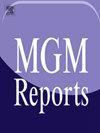Covid19 大流行对法布里病患者健康相关生活质量的影响--对未来罕见病患者护理的启示
IF 1.8
4区 医学
Q3 GENETICS & HEREDITY
引用次数: 0
摘要
背景严重急性呼吸系统综合征冠状病毒 2(SARS-CoV-2)的迅速传播导致了全球范围的 Covid19 大流行,这对患者和医疗保健专业人员来说是一个独特的挑战。慢性罕见病患者不得不面对新的负担,如无法定期到医院就诊,甚至在药物供应方面遇到困难。法布里病(Fabry disease,FD)患者受多种器官表现的影响,不仅造成身体上的负担,还造成心理上的负担和限制,通常表现为健康相关生活质量(HR-QoL)低下。我们试图研究 Covid19 大流行对 FD 患者 HR-QoL 的影响及其对罕见病患者未来护理的意义。方法这项单中心研究纳入了 2020 年 Covid19 大流行高峰期前后在我们研究地点就诊的患者。所有患者均已确诊为 FD。不包括GLA基因中存在假定致病性至良性基因变异的受试者。采用简表(36)健康调查(SF-36)来获得患者的自我报告结果。结果共纳入 60 名患者(平均年龄 47.9 ± 15 岁,53.3% 为男性)。大多数患者(63.3%)的致病基因变异与典型表型有关。基线时,66.7%的患者接受酶替代疗法(ERT),21.7%的患者接受伴侣疗法。主要器官表现为心脏(42/60,70.0%)和神经系统(39/60,65.0%)。在对 2020 年大流行高峰前后的情况进行配对比较后,SF-36 指数的所有 8 个项目都出现了数值下降。有三个项目存在组间差异:社会功能(72.5 ± 29.3 vs. 64.8 ± 29.3,p = 0.012)、能量/疲劳(56.8 ± 21.7 vs. 48.3 ± 23.9,p < 0.001)和因身体健康而导致的角色限制(64.2 ± 42.0 vs. 51.0 ± 0.001)。亚组分析(关于性别、年龄和治疗)显示,尤其是男性和年龄较大(≥50 岁)的 FD 患者在多个类别的 HR-QoL 中均有所下降。结论 全球范围的 Covid19 大流行对 FD 患者自我报告的 HR-QoL 产生了持续的负面影响,包括精神和身体两方面。目前仍不清楚疾病本身和伴随的环境(包括地方和政府的行动和限制)在多大程度上导致了这些恶化。我们的研究结果强调了为慢性进展性疾病患者提供细致、持续的跨学科护理(包括社会心理方面)的重要性,以及改变未来医疗护理观念的必要性,包括进一步推进数字化和加强当局对远程医疗保健部门的管理。本文章由计算机程序翻译,如有差异,请以英文原文为准。
Impact of the Covid19 pandemic on health-related quality of life in patients with Fabry disease - implications for future care of patients with rare diseases
Background
The worldwide Covid19 pandemic caused by the rapid spread of the severe acute respiratory syndrome coronavirus 2 (SARS-CoV-2) represented a unique challenge for patients and healthcare professionals. Patients with chronic rare diseases had to face novel burdens, like the inability to perform regular on-site visits or even difficulties in the supply of medication. Patients with Fabry disease (FD) are affected by a variety of organ manifestations leading to physical but also psychological burden and limitations, which are usually presented in low health-related quality of life (HR-QoL). We sought to examine the impact of the Covid19 pandemic on HR-QoL in patients with FD and their implications for the future care of patients with rare diseases.
Methods
This single-center study included patients seen shortly prior to and after the peak of the Covid19 pandemic in 2020 at our study site. All patients had a confirmed genetic diagnosis of FD. Subjects with presumed apathogenic to benigne genetic variants in the GLA gene were excluded. The Short Form (36) Health Survey (SF-36) was used to obtain patients‘self-reported outcome. Clinical data and SF-36 scores were collected and analysed for the time period prior to and after the peak of the pandemic.
Results
In total, 60 patients (mean age 47.9 ± 15 years, 53.3 % male) were included. The majority presented with a pathogenic gene variant (63.3 %) associated with classic phenotype. At baseline, 66.7 % were on enzyme replacement therapy (ERT), and 21.7 % on chaperone therapy. Predominant organ manifestations were cardiac (42/60, 70.0 %) and neurological (39/60, 65.0 %). After paired comparison prior and post peak of the pandemic in 2020, all eight items of the SF-36 score showed a numeric decline. Three items presented with a intergroup difference: social functioning (72.5 ± 29.3 vs. 64.8 ± 29.3, p = 0.012), energy/fatigue (56.8 ± 21.7 vs. 48.3 ± 23.9, p < 0.001), and role limitations due to physical health (64.2 ± 42.0 vs. 51.1 ± 45.5, p = 0.007).
Subgroup analysis (regarding gender, age, and treatment) revealed that especially male and older (≥50 years) patients with FD showed reductions in multiple categories of HR-QoL. The item “energy/fatigue“ presented significant declines among all subgroups.
Conclusions
The worldwide Covid19 pandemic had a persistent negative affect on self-reported HR-QoL in patients with FD, including both mental and physical aspects. It remains unclear to what extend the disease itself and accompanying circumstances including local and governmental actions and restrictions contributed to these deteriorations. Our findings stress the importance for meticulous and constant interdisciplinary care including psychosocial aspects in patients with chronic progressive diseases as well as the need for a change in mindset concerning future medical care including further progress in digitalisation and a strengthening of the remote health care sector by authorities.
求助全文
通过发布文献求助,成功后即可免费获取论文全文。
去求助
来源期刊

Molecular Genetics and Metabolism Reports
Biochemistry, Genetics and Molecular Biology-Endocrinology
CiteScore
4.00
自引率
5.30%
发文量
105
审稿时长
33 days
期刊介绍:
Molecular Genetics and Metabolism Reports is an open access journal that publishes molecular and metabolic reports describing investigations that use the tools of biochemistry and molecular biology for studies of normal and diseased states. In addition to original research articles, sequence reports, brief communication reports and letters to the editor are considered.
 求助内容:
求助内容: 应助结果提醒方式:
应助结果提醒方式:


